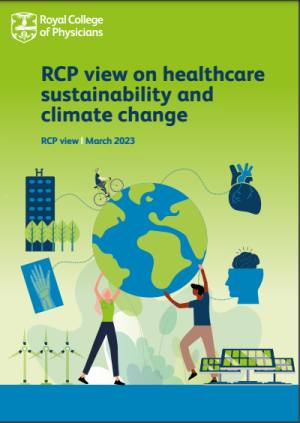
The Royal College of Physicians (RCP) has published a new position paper setting out recommendations to improve the sustainability of healthcare and reduce the health impacts of climate change.
Climate change represents the biggest long-term threat to human health. The Intergovernmental Panel on Climate Change projects an excess of 250,000 deaths per year by 2050 attributable to climate change due to heat, undernutrition, malaria and diarrheal disease, with more than half of this excess mortality projected for Africa.
The new position paper sets out a range of policy calls from what the government must do to reduce the health impacts of climate change to how we can ensure environmental sustainability is effectively prioritised in the NHS. It also includes several case studies that demonstrate how a more sustainable approach to healthcare delivery can be achieved and the impact this can have.
The paper calls on government to:
- Prioritise a just transition from fossil fuels, redirecting all funding and subsidies to renewable energy sources and technologies and implementing complementary policy initiatives to ensure this process does not exacerbate health inequalities.
- Strengthen the Net Zero Strategy to ensure there is a robust and credible pathway for reaching the UK’s emission reduction targets by 2050 at the very latest.
- Build on the UK’s presidency of COP26 and continue to push for ambitious international action to limit climate change.
- Go further in its efforts to reverse environmental decline – existing targets and commitments should be regarded as a floor not a ceiling, and policy interventions should actively seek to go beyond them.
- Put prevention at the heart of health and wider government policy, recognising that reducing avoidable ill health and demand for healthcare will require cross-government action, and has environmental, health and economic benefits.
- Fully implement recommendations from the chief medical officer’s 2022 annual report on air pollution, taking robust action across a range of different sectors to improve both outdoor and indoor air quality.
- Ensure that the infrastructure needed to enable active travel (walking and cycling) is in place across the country to realise the aim set out in the 2023 Environmental Improvement Plan that half of all journeys in towns and cities should be walked or cycled by 2030. This should be supplemented by efforts to improve the provision of public transport across the country to reduce emissions from car travel.
- Provide everyone with access to a green space within 10 minutes of their home, building on the 15-minute pledge in the Environmental Improvement Plan and setting out a clear timescale and funding commitment to deliver this.